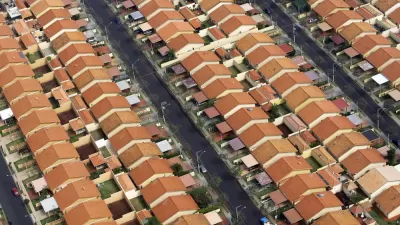A review of the recent "Future of Suburbia" event held at the Center for Advanced Urbanism at the Massachusetts Institute of Technology.

"Whether we are aware of it or not, even the most self-consciously curated 'urban' lives are staged and supplied by the jumbled realm of suburbia," begins an in-depth article by Amada Kolson Hurley examining the recent "Future of Suburbia" event held at the Center for Advanced Urbanism (CAU) at the Massachusetts Institute of Technology (MIT).
Unlike a previous article by Randy Rieland, Kolson Hurley's article offers a more critical reading of the event's proceedings, including the implied criticism of the event's single-minded support of a suburban agenda.
Also present, however, is a sympathetic ear toward the need to have a critical discussion about suburbia, rather than just falling back to the often-elitist biases assumed by self-proclaimed urbanists. "All in all, CAU is making a concerted bid to reposition suburbia as a serious subject of design inquiry," explains Kolson Hurley. "It couldn’t have come soon enough."
Among a detailed account of the event's proceedings, Kolson Hurley also makes a nuanced point about how the event's politics differs from the approache taken by "Reformers," who would retrofit suburbia. Instead, the CAU has created a space for "Validators":
They believe that suburbia is fundamentally OK. They maintain that when people have options, they will usually choose to live in a single-family home in the suburbs, and for intellectuals to resist this is classist and perverse. Validators point out (correctly) that the much-hyped urban revival we keep reading about is mostly limited to affluent white Gen Xers and Millennials. At the conference, economist Jed Kolko analyzed recent census data to show that on the whole, America continues to suburbanize.
To conclude the article, however, Kolson Hurley critiques that framework by noting the neglected subject of environmental impact of suburban land use. That criticism transitions into an appeal for further inquiry and continued effort at finding a common ground for "Reformers," "Validators," and urbanists alike.
FULL STORY: The “Future of Suburbia,” according to MIT

Planetizen Federal Action Tracker
A weekly monitor of how Trump’s orders and actions are impacting planners and planning in America.

San Francisco's School District Spent $105M To Build Affordable Housing for Teachers — And That's Just the Beginning
SFUSD joins a growing list of school districts using their land holdings to address housing affordability challenges faced by their own employees.

The Tiny, Adorable $7,000 Car Turning Japan Onto EVs
The single seat Mibot charges from a regular plug as quickly as an iPad, and is about half the price of an average EV.

Seattle's Plan for Adopting Driverless Cars
Equity, safety, accessibility and affordability are front of mind as the city prepares for robotaxis and other autonomous vehicles.

As Trump Phases Out FEMA, Is It Time to Flee the Floodplains?
With less federal funding available for disaster relief efforts, the need to relocate at-risk communities is more urgent than ever.

With Protected Lanes, 460% More People Commute by Bike
For those needing more ammo, more data proving what we already knew is here.
Urban Design for Planners 1: Software Tools
This six-course series explores essential urban design concepts using open source software and equips planners with the tools they need to participate fully in the urban design process.
Planning for Universal Design
Learn the tools for implementing Universal Design in planning regulations.
Smith Gee Studio
City of Charlotte
City of Camden Redevelopment Agency
City of Astoria
Transportation Research & Education Center (TREC) at Portland State University
US High Speed Rail Association
City of Camden Redevelopment Agency
Municipality of Princeton (NJ)




























